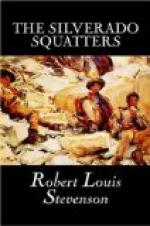Silverado platform filled the whole width of the canyon. Above, as I have said, this was a wild, red, stony gully in the mountains; but below it was a wooded dingle. And through this, I was told, there had gone a path between the mine and the Toll House—our natural north-west passage to civilization. I found and followed it, clearing my way as I went through fallen branches and dead trees. It went straight down that steep canyon, till it brought you out abruptly over the roofs of the hotel. There was nowhere any break in the descent. It almost seemed as if, were you to drop a stone down the old iron chute at our platform, it would never rest until it hopped upon the Toll House shingles. Signs were not wanting of the ancient greatness of Silverado. The footpath was well marked, and had been well trodden in the old clays by thirsty miners. And far down, buried in foliage, deep out of sight of Silverado, I came on a last outpost of the mine—a mound of gravel, some wreck of wooden aqueduct, and the mouth of a tunnel, like a treasure grotto in a fairy story. A stream of water, fed by the invisible leakage from our shaft, and dyed red with cinnabar or iron, ran trippingly forth out of the bowels of the cave; and, looking far under the arch, I could see something like an iron lantern fastened on the rocky wall. It was a promising spot for the imagination. No boy could have left it unexplored.
The stream thenceforward stole along the bottom of the dingle, and made, for that dry land, a pleasant warbling in the leaves. Once, I suppose, it ran splashing down the whole length of the canyon, but now its head waters had been tapped by the shaft at Silverado, and for a great part of its course it wandered sunless among the joints of the mountain. No wonder that it should better its pace when it sees, far before it, daylight whitening in the arch, or that it should come trotting forth into the sunlight with a song.
The two stages had gone by when I got down, and the Toll House stood, dozing in sun and dust and silence, like a place enchanted. My mission was after hay for bedding, and that I was readily promised. But when I mentioned that we were waiting for Rufe, the people shook their heads. Rufe was not a regular man any way, it seemed; and if he got playing poker—Well, poker was too many for Rufe. I had not yet heard them bracketted together; but it seemed a natural conjunction, and commended itself swiftly to my fears; and as soon as I returned to Silverado and had told my story, we practically gave Hanson up, and set ourselves to do what we could find do-able in our desert-island state.
The lower room had been the assayer’s office. The floor was thick with debris—part human, from the former occupants; part natural, sifted in by mountain winds. In a sea of red dust there swam or floated sticks, boards, hay, straw, stones, and paper; ancient newspapers, above all—for the newspaper, especially when torn, soon becomes an antiquity—and bills of the Silverado boarding-house, some dated Silverado, some Calistoga Mine. Here is one, verbatim; and if any one can calculate the scale of charges, he has my envious admiration.




